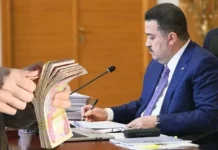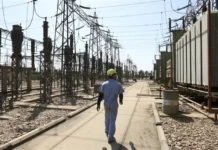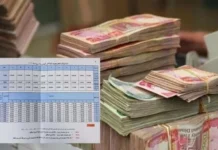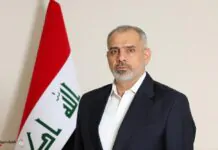Tishwash: Fuad Hussein arrives in Oman to exchange views on “current challenges”
Fuad Hussein arrives in Oman to exchange views on “current challenges”
The Iraqi Ministry of Foreign Affairs announced the arrival of its Minister, Fuad Hussein, to the Omani capital, Muscat, on an official visit aimed at strengthening bilateral cooperation between the two countries.
The ministry said in a statement that “Deputy Prime Minister and Minister of Foreign Affairs Fuad Hussein is scheduled to hold meetings during the visit with a number of Omani officials, most notably the Omani Minister of Foreign Affairs, Badr bin Hamad Al Busaidi, to exchange views on regional and international developments and current challenges.”
The statement indicated that the Iraqi Ambassador to Muscat, Qais Al Ameri, and embassy staff attended the reception ceremony. link
Tishwash: The majority of Iraq’s financial assets are in US dollars. Al-Sudani’s advisor discusses linking Iraqi banks to US banks.
On Wednesday, April 30, 2025, Mazhar Mohammed Salih, advisor to the Prime Minister for Financial Affairs, spoke about the repercussions of linking Iraqi banks to American banks.
As long as Iraq is within the dollar zone like other OPEC countries, with the US dollar constituting the majority of its financial assets from oil revenues, it is in our country’s interest to deal equally with the US commercial banking system as a global correspondent power for national banks, especially when dealing with more than one US bank operating globally (Global Bank) that has major global branches and arms, ” Saleh said in a press statement followed by Al-Jabal.
He pointed out that “the Central Bank of Iraq’s efforts to link national banks with major banks and financial institutions in the United States, with more than one bank that enjoys international standing, is an important means of providing economic stability and improving the investment, trade, and development climate in our country through integration with the dollar trade, banking, and investment zone, which remains one of the strongest and most important monetary zones in the world.”
He stressed that “reducing the costs of foreign banking transactions requires direct banking cooperation with more than one American (Global) bank, and that the Central Bank of Iraq is moving in the right, open, and rapid direction in assessing its priorities to serve the stability of the national economy at the level of foreign banking transactions and implementing them with the required speed and high guarantees .”
He pointed out that “the second American bank is responsible for providing opportunities for Iraqi banks as a global correspondent bank with multiple branches and operations to quickly implement banking operations, whether in transfers or financing foreign trade for our country’s markets, without obstacles and with transparency and high governance. In addition, it provides financing and credit lines for trade and investment in Iraq, as well as benefiting from digital banking services and highly advanced international standards, which will bring our national banks to the required global level.
These are factors that encourage the investment and business climate in our country at the same time, in the midst of integration and cooperation with the international banking system.” link
************
Tishwash: KRG official publicly criticizes Iraq’s Trade Bank over delays to ATM rollout and bank cards
A senior official in the Kurdistan Regional Government publicly criticized Iraq’s Trade Bank on Wednesday, citing significant delays and insufficient cooperation in the rollout of a high-profile digital banking initiative intended to modernize public salary payments.
The initiative, known as My Account, launched in September 2023, aiming to allow government employees in the Kurdistan Region to receive salaries digitally via bank-issued cards, reducing dependency on cash and increasing financial transparency. TBI was among several banks selected for participation.
“We are pleased to announce that the Trade Bank of Iraq is now part of the My Account project to digitize salary payments in the Kurdistan Region,” the ministry had said in a statement last year. Although welcomed in May 2024 by the Kurdistan Ministry of Finance, TBI’s participation has become a source of concern.
Nearly a year later, officials say the bank has fallen short of its commitments.
Aziz Ahmed, deputy chief of staff to KRG Prime Minister Masrour Barzani and the official leading the My Account team, spoke candidly to 964media. “It’s true, this is the first time we are publicly expressing our concerns about one of the banks in the My Account project, which is TBI,” he said. “But the scale of the issues with this bank can no longer be overlooked.”
Ahmed explained that the KRG has been waiting for over a year for TBI to fulfill a pledge to install 100 ATMs. “Despite over 40,000 requests from public employees in the Kurdistan Region to open accounts with the bank, the ATM installation process hasn’t moved forward, and the issuance of My Account cards has also been delayed,” he said.
The delay, according to Ahmed, is not just administrative but has practical consequences. “The delay in delivering ATMs and distributing bank cards has affected the speed of the banking rollout and has harmed public employees in the region,” he said.
Other banks participating in the program have also experienced occasional technical setbacks, but those were typically resolved without long-term disruption. “The level of difficulty we’ve had with TBI is different and ongoing,” Ahmed said. “Issues faced by other banks, such as temporary ATM outages, were addressed and solved. That has not been the case with TBI.”
According to the latest data obtained by 964media from the My Account project, there are approximately 650 ATMs available across the Kurdistan Region—many newly installed as part of the initiative. The project aims to expand this network to over 1,200 ATMs, reaching beyond major cities to include towns and remote areas.
This expansion is intended to ease salary access for the Kurdistan Regional Government’s 1.2 million public sector employees—roughly one ATM for every 1000 workers.
Eight banks are currently participating: BBAC, Cihan Bank, RT Bank, Bank of Baghdad, Iraqi Islamic Bank, National Bank of Iraq, Trade Bank of Iraq, and the International Development Bank.
964media has learned that the project has registered around 750,000 employees so far, with more than 450,000 having received their bank cards, enabling them to withdraw salaries from ATMs after being paid directly to their individual bank accounts.
The project has vowed to register all public sector employees for digital banking accounts by the end of this year.
Ahmed said the KRG has formally raised the issue with both the Central Bank of Iraq and the office of Iraqi Prime Minister Mohammed Shia al-Sudani. “Despite our repeated official communications and efforts to resolve the problems with the bank at the highest levels, the response and cooperation have not met expectations.”
Frustrated by the lack of progress, the KRG has opted to go public. “The lack of a satisfactory outcome from those efforts has left us no choice but to make our concerns public in the spirit of transparency,” Ahmed said.
My Account functions as an alternative to Baghdad’s Tawtin (localization) program. In February 2024, Iraq’s Federal Supreme Court ruled that salaries for public employees in the Kurdistan Region must be paid directly by the federal government, rather than through the KRG’s allocated share of the national budget.
In September 2024, public sector workers in Erbil and Sulaymaniyah expressed growing frustration as some ATMs ran out of cash, leaving many unable to access their delayed wages. However, officials overseeing the My Account project say those problems have since been addressed and that the system is now operating more smoothly. There have been no reports of widespread issues since. link





